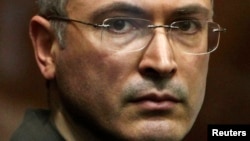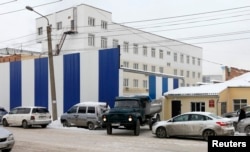MOSCOW —
Vladimir Putin said Thursday he will amnesty Mikhail Khodorkovsky, a businessman long considered to be Russia’s most prominent political prisoner.
Once Russia’s richest man, Khodorkovsky crossed Putin in the early 2000s by building a political base to challenge the new president. Khodorkovsky, then an oil company president, was tried and convicted on economic charges. He has spent the last decade in jail.
New trial unlikely
Putin told journalists: “The order for the pardon will be issued and the person will be freed.”
Earlier, at a marathon, four-hour press conference, Russia’s president said that a new trial against Khodorkovsky would be unlikely.
He also implied that Russia’s new amnesty law could apply to two other cases famous in the West. Two women from the Pussy Riot feminist group are serving jail sentences, and 28 members of Greenpeace face trial for protesting near Russia’s lone offshore oil platform in the Arctic.
These Christmas amnesties seem designed to remove points of friction with the West before the Winter Olympics open in Sochi, Russia on February 7. The U.S., German and French presidents have all declined to attend the games.
Much Western criticism focuses on Russia’s new law against exposing minors to information about homosexuality. Gay activists say the law is part of a larger homophobic environment in Russia.
'Alien' values
When an American reporter asked about the law, President Putin responded: “For me, it’s important to protect our society from certain quasi-values, which are alien for our citizens.”
He accused gay groups of “imposing their views on other countries, and doing it in a quite aggressive manner.”
Russia’s president addressed another subject sensitive to many Americans -- Edward Snowden, the fugitive American computer expert. Six months ago, Snowden leaked to reporters millions of secret files from the National Security Agency, and then won asylum in Russia.
At the press conference, Putin called Snowden “a noble” man.
“It is thanks to Snowden that a lot has changed somehow in the minds of millions of people, including in the minds of major contemporary political figures,” Russia’s leader said.
Putin’s press conference is an annual institution, broadcast nationwide, and attended by more than 1,000 reporters.
'Brotherly' act
At the outset, Russia’s president spoke forcefully to defend his bailout this week of neighboring Ukraine. Russia agreed to extend $15 billion in loans to Ukraine and to cut gas prices by one third.
Sensing that the bailout is not popular at a time when Russia’s economy is stagnating, Putin called the aid is a “brotherly” act toward the Ukrainian people, not a move to support Ukraine’s government.
“If we really say that the Ukrainian people are a brother people, and a brother country, then we are obliged to conduct ourselves as a close relative and help the Ukrainian people in this difficult situation,” he said.
Russia’s president denied that his massive aid program is designed to keep Ukraine from moving toward Europe.
"This has nothing to do with Maidan, nor Ukraine's talks with the European Union,” he said, referring to the occupation of a central square in Kyiv by pro-European protesters. “We just see that Ukraine is facing strong challenges and it has to be supported. We have such a capability and we are using it."
He argued that if Ukraine signed a free trade pact with Europe, its Soviet-era industry would collapse and the country would regress, becoming an eastern farming appendage to Europe.
Addressing Russian worries, he stressed that the $15 billion in loans would have to be paid back. Asked about loan guarantees, he only responded that a decade ago, Russia and Ukraine discussed joint administration of Soviet-era pipelines that carry natural gas from Russia to Europe through Ukraine.
Some analysts say that if Russia can win ownership of this pipeline network, it can abandon a $20 billion project to build an undersea pipeline that goes around Ukraine.
Once Russia’s richest man, Khodorkovsky crossed Putin in the early 2000s by building a political base to challenge the new president. Khodorkovsky, then an oil company president, was tried and convicted on economic charges. He has spent the last decade in jail.
New trial unlikely
Putin told journalists: “The order for the pardon will be issued and the person will be freed.”
Earlier, at a marathon, four-hour press conference, Russia’s president said that a new trial against Khodorkovsky would be unlikely.
He also implied that Russia’s new amnesty law could apply to two other cases famous in the West. Two women from the Pussy Riot feminist group are serving jail sentences, and 28 members of Greenpeace face trial for protesting near Russia’s lone offshore oil platform in the Arctic.
These Christmas amnesties seem designed to remove points of friction with the West before the Winter Olympics open in Sochi, Russia on February 7. The U.S., German and French presidents have all declined to attend the games.
Much Western criticism focuses on Russia’s new law against exposing minors to information about homosexuality. Gay activists say the law is part of a larger homophobic environment in Russia.
'Alien' values
When an American reporter asked about the law, President Putin responded: “For me, it’s important to protect our society from certain quasi-values, which are alien for our citizens.”
He accused gay groups of “imposing their views on other countries, and doing it in a quite aggressive manner.”
Russia’s president addressed another subject sensitive to many Americans -- Edward Snowden, the fugitive American computer expert. Six months ago, Snowden leaked to reporters millions of secret files from the National Security Agency, and then won asylum in Russia.
At the press conference, Putin called Snowden “a noble” man.
“It is thanks to Snowden that a lot has changed somehow in the minds of millions of people, including in the minds of major contemporary political figures,” Russia’s leader said.
Putin’s press conference is an annual institution, broadcast nationwide, and attended by more than 1,000 reporters.
'Brotherly' act
At the outset, Russia’s president spoke forcefully to defend his bailout this week of neighboring Ukraine. Russia agreed to extend $15 billion in loans to Ukraine and to cut gas prices by one third.
Sensing that the bailout is not popular at a time when Russia’s economy is stagnating, Putin called the aid is a “brotherly” act toward the Ukrainian people, not a move to support Ukraine’s government.
“If we really say that the Ukrainian people are a brother people, and a brother country, then we are obliged to conduct ourselves as a close relative and help the Ukrainian people in this difficult situation,” he said.
Russia’s president denied that his massive aid program is designed to keep Ukraine from moving toward Europe.
"This has nothing to do with Maidan, nor Ukraine's talks with the European Union,” he said, referring to the occupation of a central square in Kyiv by pro-European protesters. “We just see that Ukraine is facing strong challenges and it has to be supported. We have such a capability and we are using it."
He argued that if Ukraine signed a free trade pact with Europe, its Soviet-era industry would collapse and the country would regress, becoming an eastern farming appendage to Europe.
Addressing Russian worries, he stressed that the $15 billion in loans would have to be paid back. Asked about loan guarantees, he only responded that a decade ago, Russia and Ukraine discussed joint administration of Soviet-era pipelines that carry natural gas from Russia to Europe through Ukraine.
Some analysts say that if Russia can win ownership of this pipeline network, it can abandon a $20 billion project to build an undersea pipeline that goes around Ukraine.












